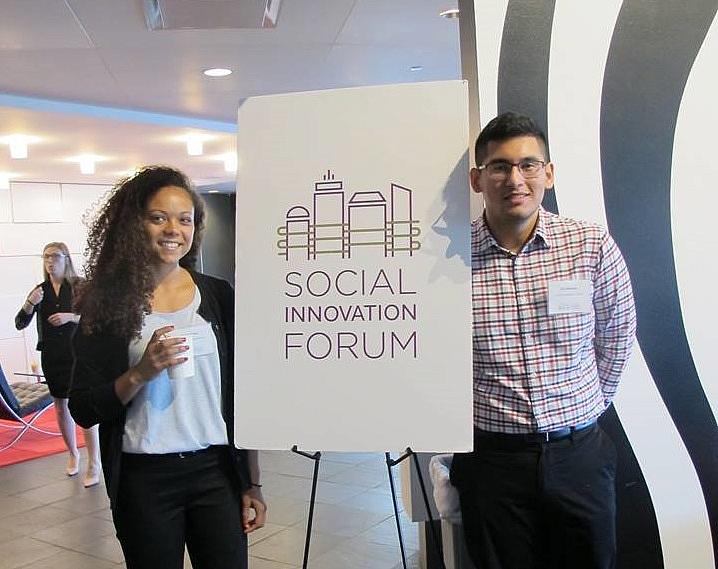
SIF summer interns Hannah Coy and Eric Orellana at the Social Innovator Second Look event in June 2017
Congratulations to our 2026 Social Innovators!

SIF summer interns Hannah Coy and Eric Orellana at the Social Innovator Second Look event in June 2017
I joined the Social Innovation Forum (SIF) as a summer intern through the Yale Alumni Community Service Fellowship, a highly selective program that matches students with incredible nonprofit organizations nationwide for eight weeks of learning and personal and professional development.
Starting in May 2017 as a Nonprofit Accelerator Program Intern, I was welcomed into a passionate team and was quickly introduced to a network of individuals and organizations, all dedicated to social change. Over the eight weeks that followed, my expectations were far surpassed. Our small-team setting provided flexibility in my role as an “intern," affording me unbound exposure to the inner workings of a successful nonprofit. I was introduced to a new dimension of philanthropic work and engaged with some of greater Boston’s leading social innovators. Although the bulk of my work was research-based, I was encouraged to pursue other projects. From attending leadership and diversity workshops, to writing blog posts and planning events, I was able to incorporate my own interests into my work.
I was introduced to a new dimension of philanthropic work and engaged with some of greater Boston’s leading social innovators.
Among those interests is youth development, an area I’ve always gravitated to as a mentor, tutor, and coach in both my hometown of Boca Raton, FL and my current residence in New Haven, CT (not to mention my personal experience as an older sister and cousin!). Now living and working in Boston, I found the summer to be the perfect opportunity to further explore youth development from a different angle through site visits, phone interviews, documentary viewings, and performance art shows. I bore witness to local Massachusetts nonprofits redefining common approaches to youth development and in these approaches, I recognized a recurring theme: process over product.
One week into the internship, a group of summer interns attended [Love Girls], an outstanding original work directed and performed by True Colors Creative Action Crew (CAC) of the Theater Offensive. Through a combination of music, movement, spoken word, and active audience participation, the artists depicted raw and honest narratives of queer women of color. A video compilation shown mid-performance highlighted the team members’ emotions, thoughts, experiences, and reactions throughout the production process. CAC Programs Manager, Sidney Monroe later explained that this footage reinforced their “process-oriented” approach where significant and pivotal moments – like trials and error, deep conversations, and exploring topics of social justice - don’t always make it to the stage despite their importance.
A few weeks later, I spent an evening with 2015 Social Innovator Waypoint Adventure, where we used indoor rock climbing as an experiential adventure-based learning opportunity for youth with disabilities to explore the concept of "challenge," which was the word of the day. What is challenge? Why is challenge good? What is the most challenging thing you did today? I pondered these questions as we went around the circle offering insight and I realized that this was the first time that I was really thinking about challenge as a process rather than a product. Our focus had less to do with the final triumph than it had to do with the journey. The participants were not excited about reaching heights that they found to be easily attainable. Rather, they were bursting with pride after struggling and then climbing to new heights. Every individual faced different challenges and to that, we celebrated everyone’s individual journeys.
During my final weeks at SIF, I also spoke with Katie Ardrey, Development Coordinator for SIF Social Innovator Doc Wayne Youth Services. Their sports-based therapeutic curriculum has paved a way for the incorporation of social-emotional learning, group therapy, and full-body therapy into mental health practices, but Katie referred to Doc Wayne as only a single piece of the puzzle. As they strategically plan for future growth and impact, the organization is trying to understand its own role within schools and within the lives of our youth.
As my summer internship was coming to an end, I reflected on what I had learned and realized that youth development is definitely an intricate social issue and my experiences in Boston confirmed that there was no single “correct” approach. SIF’s portfolio organizations demonstrate – contrary to popular belief – that much of youth development can occur outside the context of home and school through innovative solutions that take into account individual circumstance, experience, and interests.
Through culinary art, sport therapy, entrepreneurship, financial empowerment, performance and dramatic arts, journalism and communications, Boston nonprofits have created a transformative space for our youth. It is a long process, but if we focus on the process, as opposed to the immediate product, strides can be made and the results will follow. I am incredibly thankful for the knowledge and opportunity afforded to me by the Social Innovation Forum and I am excited to bring these new skills and knowledge back to my own community.
Hannah served as Social Innovation Forum’s Program Intern during the summer of 2017, providing support for the 2017-2018 SIF Social Innovator Accelerator application and evaluation process. She is currently studying psychology at Yale University.